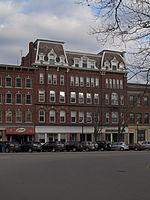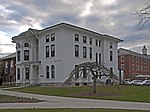New Hampshire Superior Court
1901 establishments in New HampshireCourts and tribunals established in 1901New Hampshire state courtsSuperior courts in the United States
The New Hampshire Superior Court is the statewide court of general jurisdiction which provides jury trials in civil and criminal cases. There are 11 locations of the Superior Court, one for each county and two in Hillsborough County.
Excerpt from the Wikipedia article New Hampshire Superior Court (License: CC BY-SA 3.0, Authors).New Hampshire Superior Court
Center Street, Keene
Geographical coordinates (GPS) Address Nearby Places Show on map
Geographical coordinates (GPS)
| Latitude | Longitude |
|---|---|
| N 42.934444444444 ° | E -72.279583333333 ° |
Address
Center Street
03431 Keene
New Hampshire, United States
Open on Google Maps










